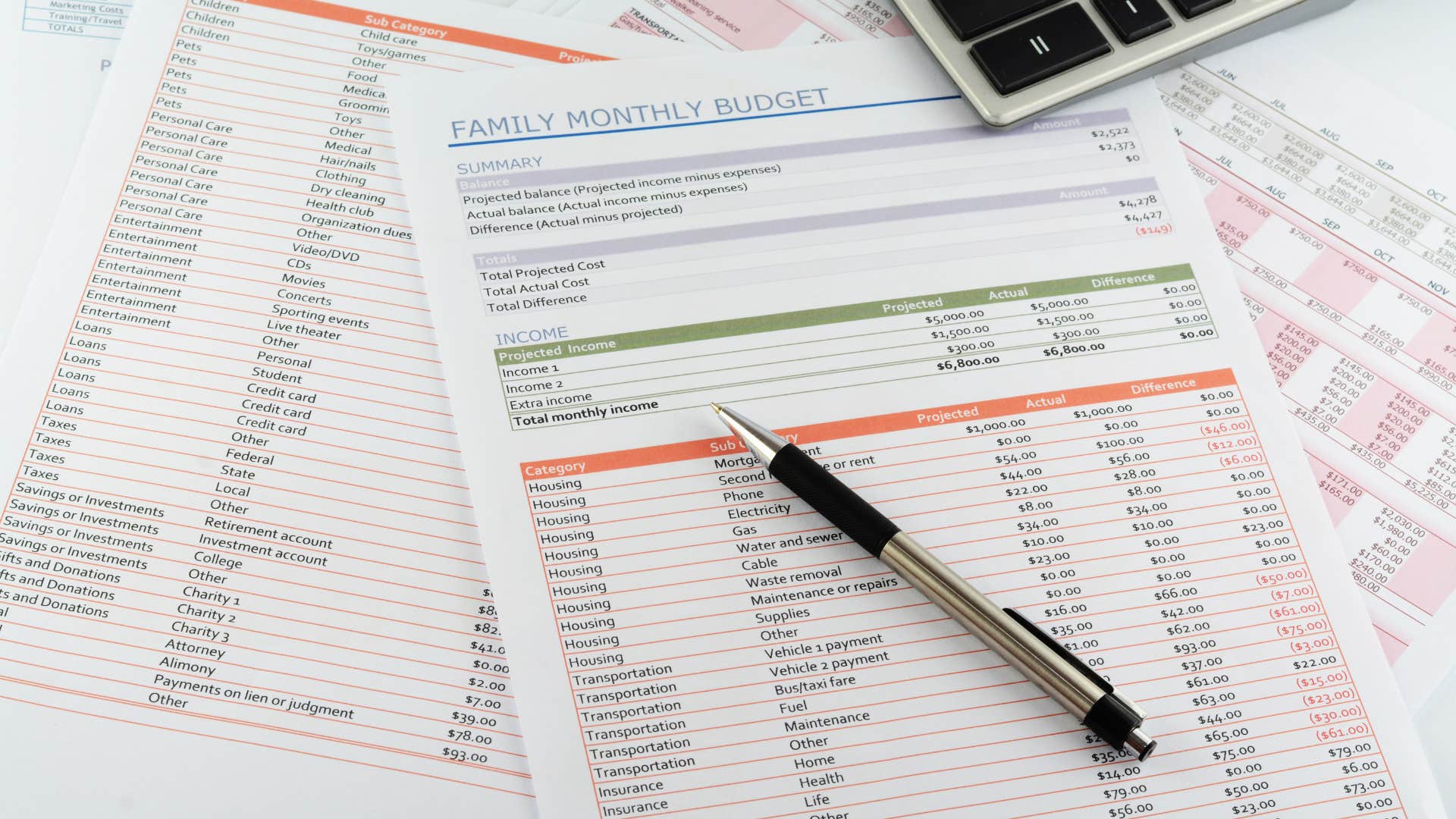Mom Reveals The Exact 10 Steps She Followed To Go From Saving $0 In 2023 To Saving $30k In 2024
Could you do it too?
 fizkes | Shutterstock
fizkes | Shutterstock In today's economy, saving money can feel impossible, especially with grocery prices being as high as they are. In fact, according to a Bankrate survey, 33% of Americans have less saved in an emergency fund at the end of 2024 than they did at the beginning of the year, and a whopping 62% feel insecure about the emergency savings they do have. Still, one savvy mom has come up with a solution to save you a boatload of money if you're willing to follow her steps.
Money-saving mom Louise Gibson took to social media to reveal the 10 steps she used that saved her $30,000 in the span of 1 year.
Here are the 10 steps a mom followed to save $30,000 in one year:
1.Audit your spending costs
 Johnstocker Production | Shutterstock
Johnstocker Production | Shutterstock
To audit your spending cost, create a spreadsheet to keep track of what you’re spending.
According to NerdWallet, the only way to effectively budget is to tackle the uncomfortable task of tracking your monthly expenses. You might think you have an idea of what you spend in a month, but actually putting it down on paper will give you a definitive picture of your spending. You’ll start to notice trends where you normally wouldn’t have before, and cutting costs will become much easier.
2.Cancel any unused subscriptions
 sitthiphong | Shutterstock
sitthiphong | Shutterstock
Sometimes, you forget that you are subscribed to a streaming service that you thought you canceled months ago. So double-check everything in your spreadsheet that you spend your money on because the last thing you want is for a service to garnish what little money you have left.
Think that gym membership is the only ghost payment draining your account each month? Think again. Patriot Federal Credit Union noted that subscriptions aren't limited to gyms and Netflix. Remember that Microsoft Office subscription you signed up for to revamp your resume? You haven't used it in a year, but you are still paying for it! Or how about the Prime Music free trial that expired six months ago?
3.Stop spending money out of habit
 vered shutzman | Shutterstock
vered shutzman | Shutterstock
Getting coffee every morning on the way to work doesn't sound like it will break the bank, but one tall iced coffee from Starbucks a day costs $3.45. One work week will set you back $17.25. A year of before-work coffees adds up to $897.00.
Does that mean you can't treat yourself to a coffee treat once a week? No! In fact, you should. Just be mindful of your spending. Don't do it out of habit. Spend with intention.
4.Spend more, not less, when you go grocery shopping
 Prostock-studio | Shutterstock
Prostock-studio | Shutterstock
Chances are the largest weekly bill you have is groceries, so why not buy in bulk to make things last longer?
Gibson noted that running out to the local store for last-minute groceries can be a budget killer. You're much better off doing one big weekly or bi-weekly trip to a bulk grocer like Costco and having a detailed list with an organized meal plan in mind. As Reader's Digest pointed out, limiting your trips to one grocer a week will also save you money on gas.
5.Thrift for clothes
 Daisy Daisy | Shutterstock
Daisy Daisy | Shutterstock
Thrifting is not only budget-friendly but also the most environmentally friendly way to shop, especially for clothes.
In 2019, Vox did a study on microplastics affecting ocean plastic pollution and the ties linking it back to our clothing as they use the most synthetic fibers. Often, these microplastics are consumed by marine life and remain in their systems, which inevitably impacts the food supply. So, next time you need some retail therapy, check out your local consignment or thrift shop and save the planet while saving money.
6.Remind yourself you don't need 'little treats' to be happy
 NDAB Creativity | Shutterstock
NDAB Creativity | Shutterstock
We can feel your anger through the screen right now because we love the line "treat yourself." The thing you need to remember, however, is that little treat likely won't bring you the happiness you hope it does.
Retail therapy has been ingrained in our psyche as a way to improve our mood, but you can get that dopamine hit in other ways.
In fact, Harvard Researchers found that the happiness you get from buying something new is so fleeting that it's simply not worth it. Instead, think of alternative free things to do with your time that can provide you with that same feeling, like taking your pup for a walk or doing a home manicure.
7.Unfollow rich influencers
 Prostock-studio | Shutterstock
Prostock-studio | Shutterstock
This may seem a bit strange, but comparison culture is becoming an epidemic thanks to social media. Seeing another person's seemingly rich lifestyle could easily make you feel bad about yourself.
It could also, as CleverGirlFinance noted, tempt you to spend money that you shouldn't. Out of sight, out of mind, so to speak. Remember, not everything you see online equates to real life. For all you know, those influencers are just pretending to live a life of luxury.
8.Set no spend challenges
 New Africa | Shutterstock
New Africa | Shutterstock
Making a game out of budgeting will make it much more fun. Think of how creative you and the rest of the family can get!
Challenge your husband to plan a date out for no money. Better yet, challenge your spouse to save $100 in a week. Do you think you could do it?
9.Set ambitious financial goals
 Ground Picture | Shutterstock
Ground Picture | Shutterstock
Saving money shouldn't be a solo challenge. Work with your partner by setting ambitious goals to reach for together. Gibson and her husband set a goal of paying off their mortgage as quickly as possible, and they work on it together.
You know how hitting the gym is a whole lot easier when you have a workout partner? That person who holds you accountable and motivates you. The same can be said about financial goals. According to the Harvard Business Review, couples are much more likely to reach their goals if they set those goals with their spouse.
10.Lose the fear of talking about money
 Inside Creative House | Shutterstock
Inside Creative House | Shutterstock
Talking about money is a sore spot for many, but it shouldn't be.
To truly be financially savvy, you need to be comfortable discussing finances with those closest to you. This is important for more than just commiseration.
A recent survey from NerdWallet found that 54% of engaged couples disagree with their partner on financial goals. If you don't talk about money and your goals are different, how can a relationship even work? Communication is essential, and when you are open about setting goals and discussing debt and aspirations, all of that becomes easier to imagine and achieve.
Sylvia Ojeda, a writer with a bachelor’s degree in Screenwriting, has over a decade of experience writing novels and screenplays. She reports on psychology, news, and human interest topics.

